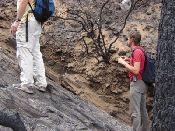|
Area and people
Most farmers are part-time farmers and of older age. They are traditional dry land farmers. Other land users are the commercial farms (often investment companies).
Current Soil and Water Conservation practices:
- Contour plowing
- Terracing
- Re-forestation (subsidized)
Investment is required for a region or at local/farm level. Government intervention required? Is it a scale issue or attitude?
Added value of DESIRE for stakeholders
The process of bringing people together; farmers with farmers; farmers with people from ministry of agriculture, etc.
Study site stakeholder workshops
There were 6 farmers (> 50 years old), scientists, farmers' organisations, local government officers (3 municipalities, regional ministry of agriculture). Murcia has specific land management related subsidies for land users to control erosion.
Limitations for spontaneous implementation of soil and water conservation practices
- Institutional limitations
- (Lack of) government support for investment in terracing
- Mosaic landscape
- Investment costs
- Knowledge
Stakeholder groups
Land degradation in the Guadalentin affects the whole society either directly or indirectly at local, regional and even national level. Selection of the most relevant stakeholders therefore is a difficult task, but during the various research projects in the last decades it has been possible to identify the most relevant stakeholders regarding land degradation issues. Given the main objective of DESIRE to identify and evaluate existing and potential conservation measures to mitigate land degradation, stakeholders that actually make decisions on land use, either at the farm or the political level, as well as scientists, are considered the most relevant stakeholders within this project. The selection of stakeholders, in random order, includes the following groups:
- Individual farmers (both with dryland and irrigated land and both large and small properties)
- Agricultural cooperation’s (e.g. »COATO, »COAG-IR (link expired))
- Irrigation communities
- Representatives of the ministry of environment and agriculture at level of municipality, region and national.
- Local Agricultural Office (»Oficina Comarcal Agraria)
- National focal point of the UNCCD.
- Tourist administration
- Confederación Hidrográfica del Segura (»Segura Basin Water Authority)
- NGO’s (Ecologistas en acción, ANSE, etc.)
- Forest engineer private companies (e.g. Tracsa, Generala)
- Forester associations (e.g. Asociación de Propietarios Forestales de la Región de Murcia).
- Scientists (ecologist/geographer/sociologist/soil scientist)
- »Fundación Instituto Euromediterráneo del Agua
- »Instituto Universitario del Agua y del Medio Ambiente
Sustainability Goals
| Goal 1 |
Maintenance and restoration of the productive capacity of the agricultural, forest, and scrublands systems |
| Goal 2 |
Reduce water loss and maintain or restore aquifer levels |
| Goal 3 |
Reduce soil erosion and prevent flooding and siltation of reservoirs |
| Goal 4 |
Increase soil fertility and soil organic matter content |
| Goal 5 |
Integration of agriculture and ecological systems in a ‘mosaic landscape’ |
| Goal 6 |
Conservation of biological diversity |
| Goal 7 |
Production of labelled ‘quality products’ from ecological agriculture |
| Goal 8 |
Use of organic waste and sludge for local green energy production |
Source: discussions between stakeholders during two stakeholder workshops in 2007 – 2008
|



